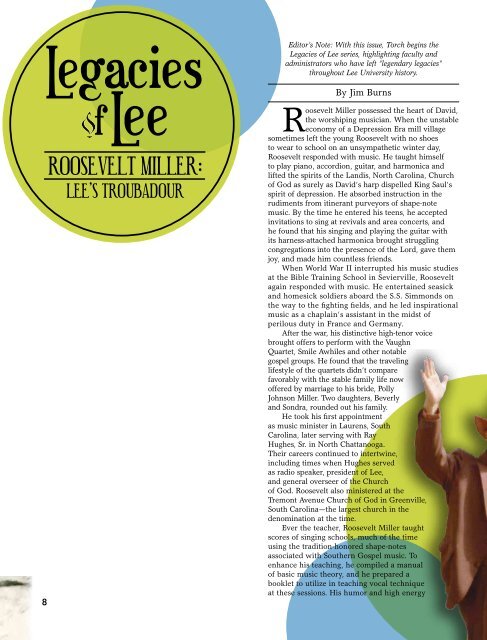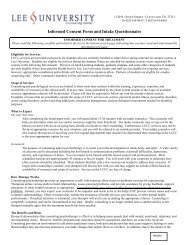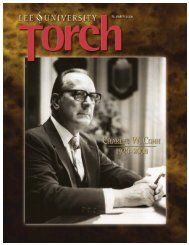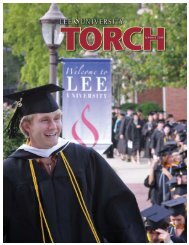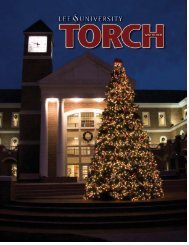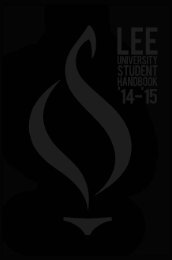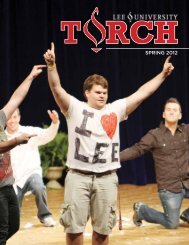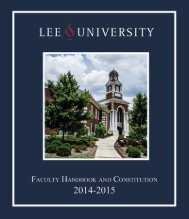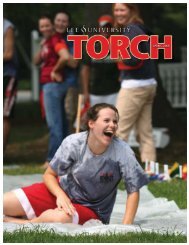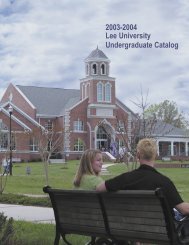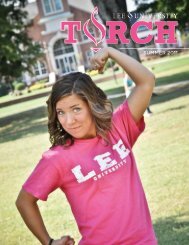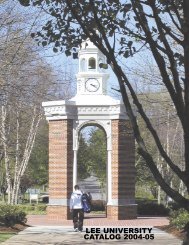SPRING 2011 - Lee University
SPRING 2011 - Lee University
SPRING 2011 - Lee University
- No tags were found...
Create successful ePaper yourself
Turn your PDF publications into a flip-book with our unique Google optimized e-Paper software.
8legaciesfleeRoosevelt MilleR:lee’s tRoubadouREditor’s Note: With this issue, Torch begins theLegacies of <strong>Lee</strong> series, highlighting faculty andadministrators who have left “legendary legacies”throughout <strong>Lee</strong> <strong>University</strong> history.By Jim BurnsRoosevelt Miller possessed the heart of David,the worshiping musician. When the unstableeconomy of a Depression Era mill villagesometimes left the young Roosevelt with no shoesto wear to school on an unsympathetic winter day,Roosevelt responded with music. He taught himselfto play piano, accordion, guitar, and harmonica andlifted the spirits of the Landis, North Carolina, Churchof God as surely as David’s harp dispelled King Saul’sspirit of depression. He absorbed instruction in therudiments from itinerant purveyors of shape-notemusic. By the time he entered his teens, he acceptedinvitations to sing at revivals and area concerts, andhe found that his singing and playing the guitar withits harness-attached harmonica brought strugglingcongregations into the presence of the Lord, gave themjoy, and made him countless friends.When World War II interrupted his music studiesat the Bible Training School in Sevierville, Rooseveltagain responded with music. He entertained seasickand homesick soldiers aboard the S.S. Simmonds onthe way to the fighting fields, and he led inspirationalmusic as a chaplain’s assistant in the midst ofperilous duty in France and Germany.After the war, his distinctive high-tenor voicebrought offers to perform with the VaughnQuartet, Smile Awhiles and other notablegospel groups. He found that the travelinglifestyle of the quartets didn’t comparefavorably with the stable family life nowoffered by marriage to his bride, PollyJohnson Miller. Two daughters, Beverlyand Sondra, rounded out his family.He took his first appointmentas music minister in Laurens, SouthCarolina, later serving with RayHughes, Sr. in North Chattanooga.Their careers continued to intertwine,including times when Hughes servedas radio speaker, president of <strong>Lee</strong>,and general overseer of the Churchof God. Roosevelt also ministered at theTremont Avenue Church of God in Greenville,South Carolina—the largest church in thedenomination at the time.Ever the teacher, Roosevelt Miller taughtscores of singing schools, much of the timeusing the tradition-honored shape-notesassociated with Southern Gospel music. Toenhance his teaching, he compiled a manualof basic music theory, and he prepared abooklet to utilize in teaching vocal techniqueat these sessions. His humor and high energymade him a favorite on the singing school circuit.By 1952, Roosevelt’s reputation as a performer, teacher, conductor, and musicminister brought him to the attention of R. Leonard Carroll, president of <strong>Lee</strong> College.Though Roosevelt at first declined an invitation to teach at the collegiate level, citing hislack of a degree, President Carroll convinced him that the numerous music coursescompleted at various institutions, along with his demonstrated performance skills,would qualify him to offer elective music studies at <strong>Lee</strong>. In the meantime,he encouraged Roosevelt to study at the <strong>University</strong> of Chattanooga (now<strong>University</strong> of Tennessee at Chattanooga). This Roosevelt did, and eventuallycompleted a bachelor’s degree from UC and a master’s from Bob Jones<strong>University</strong>. Hundreds of outstanding singers and music ministers camethrough his voice studio and classes at <strong>Lee</strong>. He became well-known for hisability to assist professional performers with ailing voices to regain vocalhealth through good vocal practices.Roosevelt maintained an active solo career throughout his ministry. Itis said that one who never heard him sing, “When They Ring Those GoldenBells” never really heard it sung. He was unquestionably one of the finestinterpreters of the gospel song of his generation. Every song he sang becamehis own. Vocal enthusiasts recognized his unusually broad range (he couldvocalize a full three octaves, from high C to low C). His beautiful voice was heardon the nationally-broadcast Forward in Faith radio program for over two decades.In 1968, Roosevelt assumed the role of director of the ladies choral ensemble begunby Mary Morris at <strong>Lee</strong>, renaming them the “Ladies of <strong>Lee</strong>.” He was particularly pleasedto have this additional outlet for recruitment of students. He arranged most of thesongs the group performed and produced at least three albums, often using his owncompositions and providing a solo or two to satisfy the requests of his supporters.Following the <strong>Lee</strong> Singers trip to Europe under Delton Alford in 1967, Rooseveltwas the first to take a <strong>Lee</strong> music group to the Holy Land and Hawaii, his favoriteperformance destinations.In a particularly fortuitous outcome of his responsibilities with the radiobroadcast, Roosevelt teamed with Radio Program Manager Bennie Triplett andNational Sunday School and Youth Director Don Aultman to form what becameone of the most well-loved and musically accomplished singing groups of itstime, the Forward in Faith Trio—ultimately called the Ministers Trio. BennieTriplett, the award-winning radio speaker and widely-recognized composer sanglead. Don Aultman, a charismatic speaker, administrator, and writer, provideda warm baritone and played piano for the trio. The three blended voices,personalities, and ministries combined in a way that brought them significantrecognition and appreciation. Their recordings and public appearancesintroduced many of Roosevelt’s songs to a broader audience. Recordsindicate that he wrote approximately 90 songs which were published inover 40 songbooks. Some of his best-known are found on recordings withthe Ministers Trio, Ladies of <strong>Lee</strong>, and his own solo recordings, along withrecordings by other artists. His admirers will remember “Stretch ForthThy hand,” “Let Brotherly Love Continue,” and “Closer to Thee.”Roosevelt remained one of <strong>Lee</strong>’s most active and successfulrecruiters from the time he arrived on campus. His travels with theMinisters Trio, Ladies of <strong>Lee</strong>, singing schools, and solo appearancesat major religious conferences across the nation provided theplatform he needed to tell about the school he loved. And <strong>Lee</strong>loved him in return. In 1982, <strong>Lee</strong> College conferred uponhim the honorary doctorate of sacred music. Hisuntimely death in May of 1986 came within just afew weeks of his retirement. In everycommissioning service at <strong>Lee</strong>, while graduatesreceive their personal Bible, signed by President PaulConn, they hear the strains of Roosevelt Miller’s best-loved song,“I Will Follow Thee,” coming from the keyboard, and Roosevelt’s legacycontinues to inspire commitment and bolster confidence as the graduatesteps into the next chapter of life.TORCH // <strong>SPRING</strong><strong>2011</strong> 9


